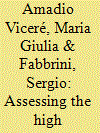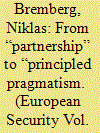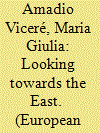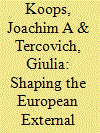|
|
|
Sort Order |
|
|
|
Items / Page
|
|
|
|
|
|
|
| Srl | Item |
| 1 |
ID:
154838


|
|
|
|
|
| Summary/Abstract |
The 2009 Lisbon Treaty institutionalised an intergovernmental constitution for managing policies traditionally a matter of national sovereignty, such as foreign and defence policies. However, important innovations were introduced in the foreign policymaking structure to limit its intergovernmental logic, in particular, with regard to the role of the High Representative (HR). It was generally assumed that those innovations would have made development of a coherent EU foreign policy possible. Yet, in one of the most significant tests for the EU’s foreign and defence policies in the post-Lisbon era, namely the Egyptian crisis (2011-14), those reforms did not work as expected. Notwithstanding the innovations, the HR’s role was diminished by the European Council’s strict control over foreign policy toward Egypt. The lack of clear policy guidelines towards the issue of democratisation in the Arab world in the 2003 European Security Strategy, although partially mitigated by the European Neighbourhood Policy and the Barcelona Process/Union for the Mediterranean, made it even more difficult for the HR to bring a European perspective into the largely intergovernmental setting.
|
|
|
|
|
|
|
|
|
|
|
|
|
|
|
|
| 2 |
ID:
174571


|
|
|
|
|
| Summary/Abstract |
The EU’s relations with countries in the Southern Mediterranean have a long history as the region is of great strategic importance for the Union and its member states. The High Representatives of the Union for Foreign Affairs and Security Policy have been highly involved in shaping these relations, and this role has been officially strengthened with institutional changes brought about with the Lisbon Treaty. This article analyses the role of the HR/VPs in shaping the EU's foreign and security policy towards the region with an analytical focus on discursive practice. Drawing on insights from practice theory in IR and EU studies, the analysis traces continuity and change in how the Southern Mediterranean is described in the drafting of key strategic documents. The main finding is that EU foreign and security policy towards the Southern Mediterranean shows a high degree of continuity despite several crises and institutional changes, although the discursive practices have evolved. The article ends by highlighting a conundrum that the EU can be said to implicitly acknowledge: if authoritarian states in the Southern Mediterranean are inherently unstable, yet stable enough to quench the democratic aspirations of their people, then what should be the basis for EU actions?
|
|
|
|
|
|
|
|
|
|
|
|
|
|
|
|
| 3 |
ID:
174569


|
|
|
|
|
| Summary/Abstract |
The negotiations with Iran about its nuclear programme have seen the most protracted involvement of the High Representatives of the European Union in a high-profile policy case. This article traces the evolution of the High Representatives’ participation in the negotiations, from the first contacts with the E3 (Germany, France and the United Kingdom) in 2003 to the adoption of the Joint Comprehensive Plan of Action in 2015. It focuses on the institutional role the High Representatives played in relation with the directoires leading the talks with Iran – first the E3 and, since 2006, E3/EU. In this context, it examines the personal and organisational factors that affected the influence each of the three High Representatives (Javier Solana, Catherine Ashton and Federica Mogherini) had in regard to the directoires. The analysis distinguishes specifically between the phases before and after the 2009 Lisbon Treaty. The article shows how similar personal qualities of the three High Representatives in terms of problem-solving and trust-building gave them political capital that enabled them to adopt a fairly constant role as bridge-builders within the directoires and between the directoires and other actors. The reforms of the Lisbon Treaty had only a minor impact.
|
|
|
|
|
|
|
|
|
|
|
|
|
|
|
|
| 4 |
ID:
174572


|
|
|
|
|
| Summary/Abstract |
Despite a growing “momentum” on European Union (EU) security and defence, there are no academic analyses that aim to systematically assess the role of the High Representative of the Union for Foreign Affairs and Security Policy and Vice President of the European Commission (HR/VP) in these strategic domains. This is surprising given that the HR/VP is one of the central actors in the complex institutional architecture of EU security and defence. To fill this gap in the scholarly literature and to contribute to a more fine-grained analysis of the two post-Lisbon Treaty HR/VPs, the article assesses Ashton and Mogherini’s mandates in these fields. This study is particularly relevant because the HR/VP’s hybrid institutional role may represent a unique analytical angle to investigate a formally intergovernmental sector, strongly shaped also by EU institutions’ authority over defence-industrial policy. Following these considerations, the article looks at how the two HR/VPs managed to navigate both the military and the defence-industrial dimensions of EU security and defence.
|
|
|
|
|
|
|
|
|
|
|
|
|
|
|
|
| 5 |
ID:
174570


|
|
|
|
|
| Summary/Abstract |
My article addresses the role of the two post-Lisbon High Representatives (HRs), Catherine Ashton and Federica Mogherini, in EU approach to the Eastern neighbourhood. Adopting a broad conceptualisation of EU foreign policy and drawing on the scholarly literature on new intergovernmentalism, it focuses on events that marked the HRs' mandates in the cases of Kosovo and Ukraine. In the case of Kosovo, it examines the HRs' role in the conclusion of the so-called Brussels Agreement (April 2013); and of the August 2015 agreements. In the case of Ukraine, it reconstructs how the HRs dealt with the events leading up to the November 2013 Vilnius Summit; and with those leading up to the conclusion in February 2015 of the Minsk II Agreement. The article argues that the European Council exerts tight control over the post-Lisbon HR, and EU foreign policy-making processes more generally. Nonetheless, the empirical analysis demonstrates that, under certain circumstance, the HR can significantly influence EU foreign policy in the post-Lisbon era.
|
|
|
|
|
|
|
|
|
|
|
|
|
|
|
|
| 6 |
ID:
174566


|
|
|
|
|
| Summary/Abstract |
The Lisbon Treaty recently celebrated its 10th anniversary. The 2009 legal text was an attempt to enhance the unity, consistency and effectiveness of the EU’s action in an increasingly volatile world. And yet, the post-Lisbon time period has been characterised by multiple crises coming from the West, the East, the South, and even from within the EU. Against this backdrop, our Special Issue makes a systematic assessment of the EU's foreign policy post-Lisbon and of its evolution by focusing on the role of the High Representative of the Union for Foreign Affairs and Security Policy (HR/VP). Assessing the post-Lisbon HR/VPs provides important insights on EU foreign policy processes over the past decade. In this introduction, we discuss the three research questions that guide our collection of articles, as well as our theoretical and empirical contribution to existing scholarly literature.
|
|
|
|
|
|
|
|
|
|
|
|
|
|
|
|
| 7 |
ID:
174567


|
|
|
|
|
| Summary/Abstract |
This article assesses the role, influence and core aspects of the EU High Representatives’ (HR/VPs) “political leadership” in the context of their efforts to advance the institutionalisation of the EEAS and its crisis management structures in the post-Lisbon era. By combining analytical lenses from the literature on “European political leadership”, foreign policy analysis (FPA) and political psychology with insights from a wide range of semi-structured interviews and primary sources, the article analyses how the leadership approaches of Catherine Ashton and Federica Mogherini were influenced by core aspects, such as institutional setting, situational factors and “personal qualities”. By examining how both HR/VPs and their chosen advisors sought to shape the EU’s EEAS and crisis management institutions, scholars can gain important insights about how “personal qualities” and prior foreign policy experience can influence the HR/VPs strategic choices and their impact within and across the EEAS. Finally, the article considers the differing effects between “maverick” and “orthodox” leadership and approaches and concludes that whilst outside perspectives can bring fresh ideas and institutional innovations, they will fail to be of lasting significance and permanence if not accompanied by sufficient support from the dominant foreign and security policy conventions.
|
|
|
|
|
|
|
|
|
|
|
|
|
|
|
|
|
|
|
|
|